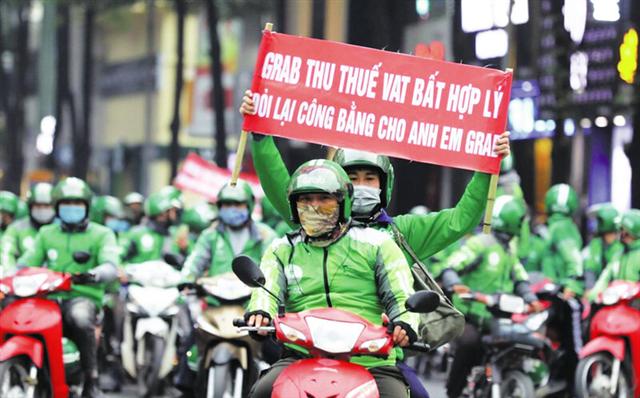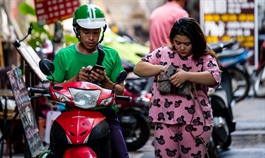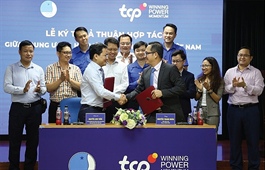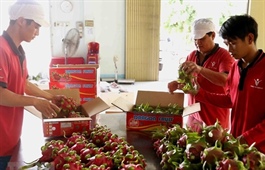Grab blamed for exploiting legal loopholes to do unfair business
Grab blamed for exploiting legal loopholes to do unfair business
It is unacceptable that Grab is shifting their tax obligation to driver-partners and customers, said an expert.
It is not a coincidence that Grab is under fiery criticism from both its driver-partners and customers, which raises the question whether the ride-hailing firm is exploiting a legal loophole for unfair gains.

Grab's drivers stage protest against the ride-hailing firm's new policy. Photo: Thanh Dat.
|
Under the government Decree No.126/2020/ND-CP, which provides further guidance on the Law on Tax Management and became effective since December 5, 2020, Grab is subject to pay 10% value added tax (VAT) for all revenue from the transportation business, but since the riding fee is split between Grab and driver-partners, it is unclear whether Grab has to collect the tax that their driver-partners have to pay.
Two days later, Grab announced a 5 – 6% increase in transportation fares for both Grabcar and Grabbike services, saying that the move is aimed to keep drivers’ income unchanged. The story did not end there as Grab raised its commission fees against their driver-partners to 27.27% of the fare from the previous 20%.
A Grab representative told local media the commission they charged driver-partners actually remains the same at 20%, while the additional amount is what drivers are supposed to pay for VAT and Grab is responsible for collecting and paying tax authorities on behalf of the former.
According to Grab, before Decree No.126, drivers are subject to 20% of commission fee plus 3% VAT and 1.5% of personal income tax (deductible from their remaining 80% revenue). But since the effectiveness of the decree, the VAT rate would go up to 10%.
Under this explanation, drivers, instead of Grab, have to shoulder the full VAT amount that should have been otherwise, not to mention that the ride hailing firm is hiking the transportation fares nationwide.
Time for local authorities to step in
Lawyer Bui Dinh Ung from Hanoi Bar Association told Hanoitimes there is a clear sign that Grab is exploiting legal loophole from a government decree that was introduced to guide the firm fulfilling its tax obligation in first place.
“It is unacceptable that Grab is shifting its obligation to both their drivers and customers,” he noted.
According to Mr. Ung, Grab has been refuting claim that it is a transportation operator despite being the decider of transportation fares.
“There is also an unfair partnership between Grab and their drivers,” Mr. Ung stated, adding while being called as “partner”, they have to cover all the costs and efforts related to their works, and Grab only provide a platform to connect drivers and customers.
But as Grab only plays a modest role in this process, they are the one who determines the fare and commission rate, putting obligation to pay VAT and income taxes to drivers, he said.
“Grab is benefiting from both higher commission rate and transportation fares, as such, local authorities should come in and clarify this matter,” Mr. Ung suggested.
Dinh Trong Thinh, a lecturer at Academy of Finance, said this situation shows there is a lack of legal framework to manage firms likes Grab. “Competent agencies should determine which type of business Grab is operating and impose a suitable tax rate.”
Mr. Thinh also disagreed with Grab’s view that drivers should bear the VAT tax. “They should not be partner but Grab’s employees. Therefore, under the Labor Code, drivers must be entitled to a labor contract and all associated benefits.”
“Grab should be the one to pay the 10% VAT just like all transportation businesses,” he concluded.



























